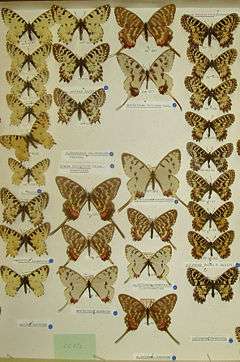Sericinus
Sericinus is a genus of swallowtail butterflies placed in the subfamily Parnassiinae. The genus has a complex history and a multiplicity of names have been applied to its single species.
| Sericinus | |
|---|---|
 | |
| Museum specimens of Sericinus, centre | |
| Scientific classification | |
| Kingdom: | |
| Phylum: | |
| Class: | |
| Order: | |
| Family: | |
| Subfamily: | |
| Genus: | Sericinus Westwood, 1851 |
| Species | |
| |
Taxonomy
- See Notes below for abbreviations used
Sericinus Westwood, 1851 (Transactions of the Entomological Society of London. NS I: 173), monobasic telamon Donovan (Sericinus Wood, 1877: Suicinus Draesecke, 1923) montela Gray, 1853.
- Subspecies manchurica (Bang-Haas (i.l.) van Rosen, 1929 (North China: South Manchuria)
- Subspecies amurensis Staudinger, 1892 (East U.S.S.R., Amurland-Ussuri)
- Form telemachus Staudinger, 1892 gen. vern.
- Form amurensis Staudingers gen. vest.
- Form minusculus Eisner, 1962
- Subspecies eisneri Bryk 1932 North East Korea (probably amurensis) gen. vern. not described.
- Form eisneri Bryk gen. aest.
- Form binaria Eisner, 1962
- Form unaria Eisner, 1962 !
- Subspecies koreana Fixsen, 1887 (melanogramma Bryk, 1846) Korea
- Form fixseni Staudinger, 1892 gen. vern.
- Form koreanus Fix. gen. aest.
- Form grayi Fixsen, 1887
- Form grundi Eisner, 1962
- Form binaria Eisner, 1962
- Form strandi Bryk 1913
- Form flavomaculata Eisner, 1962
- Form minusculus Eisner, 1962
- Form magna Eisner
- Form rubrocatenata Eisner
- Form posteriorsubmarginalisinterrupta (!) Eisner, 1974
- Subspecies montela Gray, 1852 (telamon Donovan, 1798: hoenei Hering), (Central and North China - Peking, Nanking, Chekiang, Shanghai)
- Form strandi Bryk, 1913
- Form telmona Gray 1852 gen. vern. (hoenei Bryk, 1932)
- Form telmononula Bryk
- Form ruth Eisner, 1962
- Form montela Gray, 1852 gen. aest.
- Form cellopura Eisner, 1954
- Form cellopurissima Eisner, 1954
- Form elegantissima Eisner, 1954
- Form flavomaculata Eisner, 1954
- Form miniuscula Eisner, 1962
- Form binaria Eisner, 1962
- Form nigricans Eisner, 1962
- Form eva Bryk and Eisner, 1935
- Form absurdus Bryk, 1913 (West China, South Shantung, Lau shan, Tientsin)
- Subspecies elegans Bryk, 1913 (leechi Rothschild, 1918) (West China)
- Form telmona Gray gen. vern.
- Form elegans Bryk gen. aest.
- Form strandi Bryk, 1913
- Form leechi Rothschild, 1918
- Form cressoni Reakirt
- Subspecies anderssoni Bryk, 1941 (Central China: Hupei anderssoni Bryk, gen. aest.
- Subspecies magnus Fruhstorfer, 1913 (South China: Kiangsi, Liu- kiang
- Subspecies kansuensis Eisner, 1962 (China: Kansu, Tsinglingshan, Szetchwan)
- Subspecies shantungensis Hering, 1935 (China: Shantung)
- Form cellopurissima Eisner, 1954
- Form binaria Eisner, 1962
- Form rubrocatenata Eisner, 1962
- Form quadripicta Eisner, 1962
- Form elegantissima Eisner, 1954
Notes
- monobasic = founded containing a single species, same as "monotypic" if no more species are added
- gen. vern. = vernalis, genetically determined spring generation
- gen. aest. = aestivus, genetically determined summer generation
- gen. vest. = genetically determined vestigial form
- (!) = nomen collectivum, a nomenclatural/descriptive term incorrectly used by Curt Eisner in a taxonomic sense (infrasubspecific)
- i.l. = in litteris, correspondence, not published
gollark: I don't know about in the US, but there is a *lot* of difference in earnings between courses.
gollark: The UK government has some interesting data from large-scale surveys on employment status of people after graduating from university.
gollark: I'm pointing out downsides to it.
gollark: ferraman said "there's no downside to learning it".
gollark: Suffering horribly, if you *don't* enjoy it?
References
- Bryk, F. (1913) Neue Parnassiiden-Formen aus dem Zoologischen Museum zu Berlin.Archiv für Naturgeschichte (A) 79 (3): 1-3; pl. 1 [partim].
- Bryk, F. (1932) Neue Zerynthiinae Parnassiana 2 (6-8): 102-104.
- Donovan, E. (1798) An Epitome of the natural History of the Insects of China.E. Donovan, London.
- Eisner, C. 1954 (Parnassiana nova): III. Einige neue Formen in der Familie der Parnassiidae Zoologische Mededelingen 33 (8): 55-57
- Eisner, C. (1962) Parnassiana nova XXXII. Nachträgliche Betrachtungen zu der Revision der Subfamilie Parnassiinae (Fortsetzung 5).Zoologische Mededelingen 38 (7): 105-128.
- Fixsen, C. (1887) Lepidoptera aus Korea .Mémoires sur les Lépidoptères 3: 233-356, pls 13-15, 1 map
- Gray, G. R. (1852) On the Species of the Genus Sericinus. Proceedings of the Zoological Society of London 1852: 70-73
- Hering, M. (1935) Neue Unterarten von Sericinus telamon (Donov.) Internationale Entomologische Zeitschrift 29 (17): 193-195
- von Rosen, K. (1929). Papilio. In (A. Seitz ed.) The Macrolepidoptera of the World. The Palearctic Butterflies. Alfred Kernen. Stuttgart. Suppl. 1 : 7-20.
- Rothschild, [W.] (1918) Catalogue of Zerynthiinae and allied genera in the Tring Museum, with critical notes., Novitates Zoologicae 25: 64-75.
- Staudinger, O. (1892) Die Macrolepidopteren des Amurgebietes. I. Theil. Rhopalocera, Sphinges, Bombyces, Sphinges Mémoires sur les Lépidoptères 6: 83-658
External links
This article is issued from Wikipedia. The text is licensed under Creative Commons - Attribution - Sharealike. Additional terms may apply for the media files.